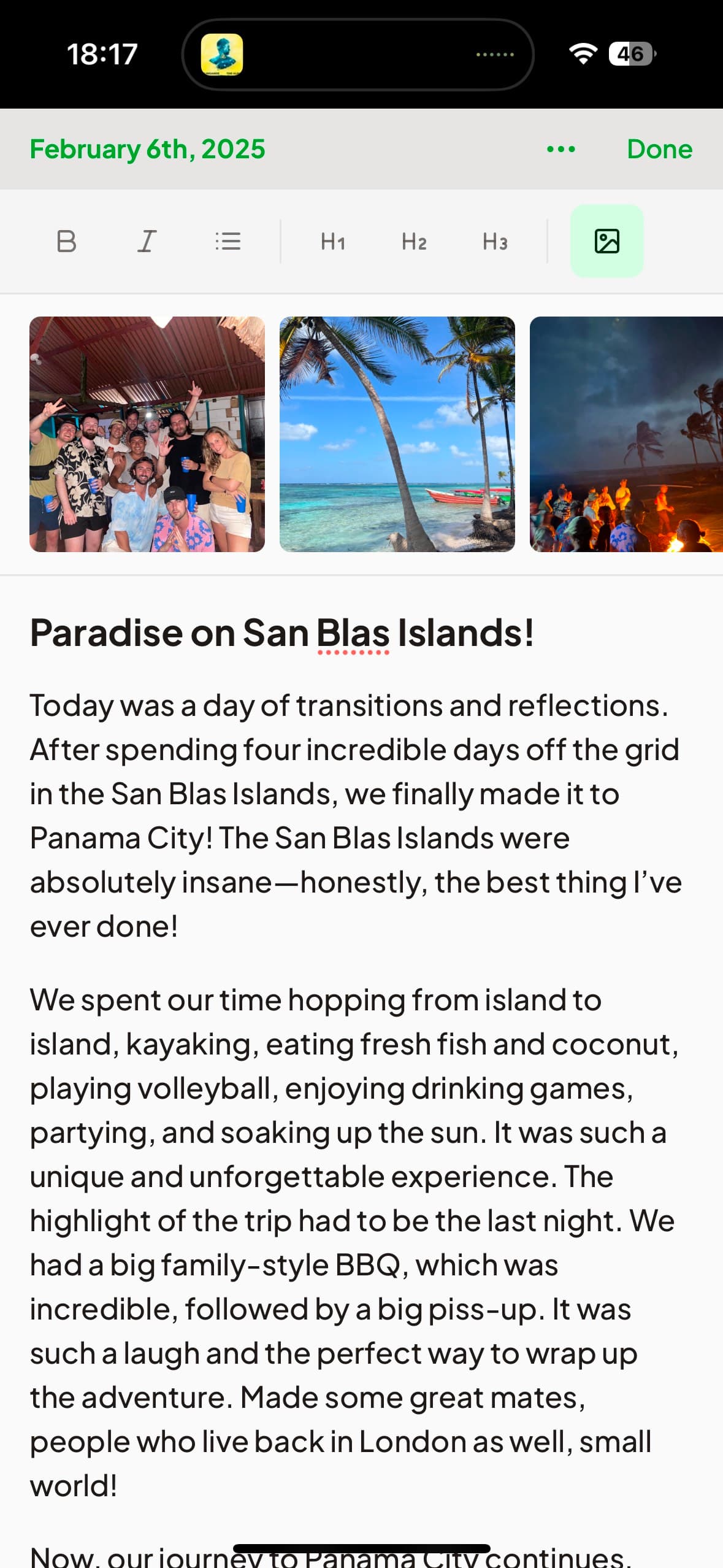Travel journaling
has never been
this easy.
Too busy to journal while traveling? Journey Jotter is the AI journalling app that helps you capture every detail in just a few minutes a day. So you can keep the unforgettable, unforgettable.
Join The Waitlist



Travel more, Capture more
Journal in just minutes a day
Spend less time writing and more time exploring. Journey Jotter helps you quickly document your travel experiences in just minutes a day, so you never miss a moment.
Engaging Prompts
Talk to Journey Jotter like you would a friend
Journey Jotter feels like chatting with a travel companion. Its thoughtful and quick and easy prompts make journaling fun and effortless, helping you capture the heart of your adventures without overthinking.


Your Story, Your Style
Beautifully written journals in your words
Your travel stories deserve to be told your way. Journey Jotter adapts to your unique voice. Whether you're cracking jokes, pouring your heart out, or simply keeping it factual. Every journal feels like you wrote it.
Relive and Reflect
Keep track of your treasured photos
Add your favorite photos to each journal entry and bring your travels to life. Capture stunning views, unforgettable moments, and the little details that make your journey unique.

Make your travel stories
unforgettablenow.
Join The Waitlist Today
Travelers love Journey Jotter
Lizzie
I used to feel guilty about never keeping a travel journal, but this app made it so simple. It's quick, easy, and now I actually remember the little details I'd have forgotten.
Lizzie
London
Becca
I never thought I'd be someone who journals, but Journey Jotter made it work for me. It's like jotting down your day without overthinking it.
Becca
San Diego
Eric
I'd always forget the best parts of my trips. This app helped me keep track without spending hours writing.
Eric
LA
Jacob
It's not just about the big moments—Journey Jotter helped me remember the small things that made my trip special.
Jacob
Amsterdam
Kelly
I've tried so many ways to journal while traveling, but I'd always give up after a week. I actually stick with Journey Jotter
Kelly
NYC
Izzy
Love it, so fun to use, will be using on next trip.
Izzy
London
Annaleike
It's really cool how it works, with all the questions and prompts. Really helpful to reflect on what you did. Espically when you are really tired (which I am right now)
Annaleike
Netherlands
Jane
So far so good!!! It's like a little friend to keep in your pocket especially if you're traveling alone.
Jane
Boston
Kelly
Journey jotter is such an incredible app for cataloging my travels! It's easy to use, the prompts are SO helpful, and the resulting journal sounds like me. I love having an app that helps me remember all the special moments from my trip.
Kelly
27
Dani
With the fast pace of hostel life, Journey Jotter makes it easy to capture memories from your travels. I just wish I had found it ten countries earlier.
Dani
California
Simple pricing for your adventures
Weekly
Perfect for short-term travelers looking to document quick trips.
- AI journalling chatbot
- Unlimited photo storage
- Data backup & sync
Monthly
Perfect for backpackers and digital nomads.
- AI journalling chatbot
- Unlimited photo storage
- Data backup & sync
Yearly
Ideal for frequent travelers who want to keep a journal of all their adventures throughout the year.
- AI journalling chatbot
- Unlimited photo storage
- Data backup & sync